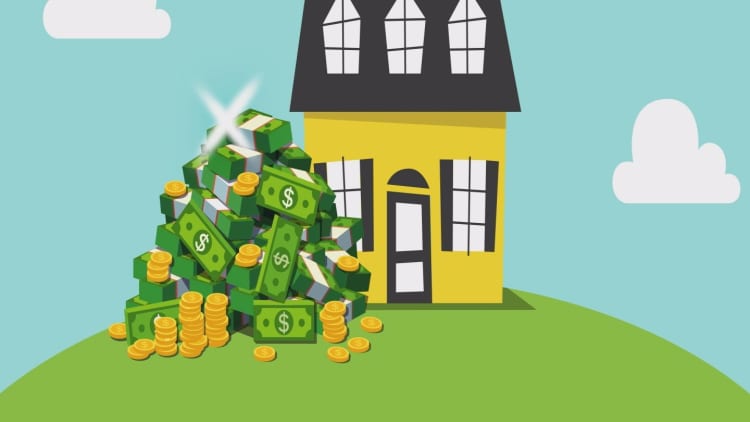Whether you're planning on gutting your bathroom or putting in new landscaping, odds are you'll be digging into your own pockets to pay for it.
A recent survey by TD Bank found that more than 90 percent of the consumers it polled are planning to tap their own savings to cover their home renovation projects.
"The public is asking 'How can I most cost-effectively renovate my home?'" said Jon Giles, head of home equity lending at TD Bank. "But we've also found that much of the population isn't aware of existing home equity products."
The bank surveyed 100 consumers at the Philadelphia Home Show earlier in this month.
Though the sample size is small, the results may be reflective of a larger trend.
Indeed, fewer people overall have been taking out home equity lines of credit or HELOCs, which allow you to borrow against the value of your home.
There were 313,744 HELOCs originated in the third quarter of 2018, reflecting an 11 percent decline from the prior year, according to ATTOM Data Solutions.
Rising interest rates may be the culprit.
HELOCs typically have adjustable interest rates, and they fluctuate along with the federal funds rate. Right now, the average rate on a HELOC is 5.54 percent.
Here are a few financing methods you can consider to cover your home remodeling expenses.
Fixed-rate option HELOC
If you're planning on remodeling your home in stages, but you don't want to run the risk of rising interest rates over time, think about asking your bank for a HELOC with a fixed rate option.
These so-called hybrid HELOCs allow you to convert a portion of the amount you've borrowed to a fixed rate that you will repay over a specified period of time.
"This line of credit is revolving, and there is a lot of flexibility to borrow and repay the loan as cash flow permits," said Greg McBride, chief financial analyst for Bankrate.com. "It's conducive to home improvements that may be incurred in stages."
Home equity loan
Home equity loans often come with a fixed rate, which are now averaging around 8.76 percent, according to Bankrate.com.
This might be a good option for someone who's covering the bill for a large upfront expense, as you're receiving the loan proceeds in a lump sum, not drawing on it as you need it as you would with a line of credit.
Returns on cash have improved, but borrowing will cost you more than what you earn on savings.Greg McBridechief financial analyst, Bankrate.com
Be aware that when you take out a HELOC or a home equity loan, you may have snare a tax break — as long as you itemize on your tax return.
Under the Tax Cuts and Jobs Act, you may be able to deduct the interest on home equity loans and HELOCs as long as you're using the money to buy, build or substantially improve your dwelling.
As of 2018, you may deduct interest on up to $750,000 of qualified residence loans, which includes mortgages and loans against your equity.
Personal loans
If you have sterling credit and you don't necessarily want to borrow against your home, you can consider a personal loan.
The average rate on a personal loan for a borrower with a credit score between 720 and 850 is 9.8 percent, Bankrate.com found. Those with credit scores below 629 could be on the hook for an average rate of 28.2 percent.
Be aware that personal loans aren't qualified residence loans, so you won't be able to capture the tax break you'd get for interest on HELOCs, home equity loans and mortgages. On the other hand, your home isn't collateral against the loan and lenders can't seize your home if you fail to pay.
Payment plans
Contractors sometimes offer homeowners the opportunity to pay for large projects in installments, especially if it's a major renovation like an addition to your home.
In this case, you and your contractor would work out an agreement in which you pay for the project as it's completed.
Use caution here and be sure to read the fine print of your contract, experts advise. Keep an eye out for fluctuating interest rates and hidden fees attached to your payment plan.
Another potential issue when you remodel: a contractor can put a construction lien on your home until you've paid for the work in full. Liens are claims against your home. In this case, the contractor can file a claim against your property to protect him or her in the event you don't foot the bill, which could impede a sale.
"If you're going to have a lien on your home, then why not just go with a home equity line of credit that will give you more flexibility and potential for tax deductibility," McBride said.
Your savings
The best way to avoid financing costs and additional complexity is to pay for the project yourself.
If you've set your sights on a project and your renovation can wait, consider building your cash in a high-yield savings account.
And of course, your "dream kitchen fund" should be separate from your emergency fund.
High-yielding savings accounts are paying interest rates upward of 2 percent, and banks continue to sweeten the deal as the Federal Reserve raises rates.
"Returns on cash have improved, and borrowing will cost you more than what you earn on savings," said McBride.
More from Personal Finance
Most Americans don't have $1,000 to cover an emergency
If you're young and get a small windfall, here's how to invest
Buying or selling your home? Is your agent working in your best interest?



